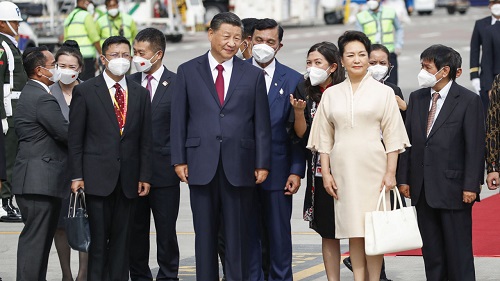This post has already been read 377 times!
US President Joe Biden and China’s Xi Jinping meet in Bali on Monday with Washington hoping to set “guardrails” for relations between the rivals and Beijing looking to put ties “back on track”.
The superpower sitting down, on the sidelines of the G20 summit, will be the pair’s first face-to-face since Biden took office and comes with the world’s two largest economies vying for international primacy.
Xi arrived in Bali on Monday afternoon, on only his second overseas trip since the pandemic, after a visit to Kazakhstan and Uzbekistan in September.
Rivalry between the world’s top two economies has intensified sharply as Beijing has become more powerful and more assertive about replacing the US-led order that has prevailed since World War II.
Biden has said the meeting should establish each country’s “red lines”, and the overarching goal will be setting “guardrails” and “clear rules of the road”, a senior White House official told reporters hours before the summit.
“We do all of that to ensure that competition does not veer into conflict.”
Biden is expected to push China to rein in ally North Korea after a record-breaking spate of missile tests and fears Pyongyang will soon carry out its seventh nuclear test.
Xi and Biden have spoken by videoconference five times since the US leader took office but the Chinese president’s last in-person US summit was with Donald Trump in 2019.
Beijing wants Washington to “work together with China”, foreign ministry spokeswoman Mao Ning said Monday.
She called for the United States to “appropriately keep differences in check, promote mutually beneficial cooperation and avoid misunderstandings and misjudgements in order to push US-China relations back on track for healthy and stable development.”
Xi arrives buoyed by securing a landmark third term in office, cementing him as the most powerful Chinese leader for generations.
Biden meanwhile has been bolstered by his Democratic Party’s better-than-expected showing in midterm elections.
He won’t be the only leader meeting Xi, with Australian Prime Minister Anthony Albanese slated to hold talks Tuesday that will be the first formal sit-down between leaders of the two countries since 2017.
“There are no preconditions on this discussion. I am looking forward to having constructive dialogue,” Albanese told reporters on arrival in Bali Monday.
– Putin staying away –
The G20 summit opens on Tuesday and comes with food and fuel prices spiking worldwide, Ukraine mired in conflict and the renewed threat of nuclear war casting a menacing pall.
Russian President Vladimir Putin is staying away and has instead sent veteran foreign minister Sergei Lavrov.
Officially, neither the war in Ukraine, nor Putin’s dark threats to use nuclear weapons are on the summit agenda, but the conflict will dominate discussions.
Soaring energy and food prices have hit richer and poorer G20 members alike –- and both are directly fuelled by Putin’s war.
On Monday, US Treasury Secretary Janet Yellen said an end to the conflict was “a moral imperative and the single best thing we can do for the global economy”.
Russia will also be under pressure to extend a deal allowing Ukrainian grain shipments through the Black Sea when the agreement expires on November 19.
British Prime Minister Rishi Sunak will urge the agreement be renewed and call for “a G20-wide commitment never to weaponise food production and distribution”, Downing Street said.
– ‘Never been this complex’ –
At a minimum, Biden and his allies would also like to see the G20 make it clear to Putin that nuclear war is unacceptable.
But even a clear statement on this issue from the grouping is likely to be blocked by a mixture of the Russian opposition and Chinese unwillingness to break ranks with its ally in Moscow or give Washington a win.
The G20 has always been more comfortable discussing finance and economics than security and Moscow would like it to stay that way.
“We categorically reject the politicisation of the G20,” the Russian foreign ministry said Sunday, offering a taste of what leaders might hear from the famously unbending Lavrov.
G20 ministerial meetings leading to the summit have failed to agree on a final joint communique and Indonesian officials said Monday it remained a “work in progress” and a “main goal” for the summit.
“Honestly, I think the global situation has never been this complex,” Indonesian government minister Luhut Binsar Pandjaitan said Sunday.
“If eventually (the G20) leaders do not produce a communique, that’s that, it’s OK.”



